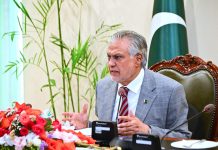ISLAMABAD, AUG 30 (DNA) — Given the multifaceted dimensions, blasphemy issues cannot be effectively addressed in isolation. The prevailing fragmented response has not only undermined internal discourse but has also exposed Pakistan to vulnerabilities on the international stage.
As such, a unified, strategic approach is essential, one that transcends emotionally driven reactions.This requires prioritizing sustainable legal and academic efforts, reinforcing the rule of law, and adopting a proactive, diplomatically astute stance globally.
Only through a cohesive and rational strategy can Pakistan safeguard its interests and uphold the sanctity of its religious principles and Prophet Muhammad (PBUH). This was discussed during a consultative meeting on ‘The Judgment of Supreme Court of Pakistan in Mubarik Sani Case and the Way Forward’ held at the Institute of Policy Studies (IPS), Islamabad.
The session, chaired by Allama Muhammad Raghib Hussain, chairman Council of Islamic Ideology, was addressed by Khalid Rahman, chairman IPS, Allama Zahidur Rashdi, a leading religious scholar, Dr Ataullah Mahmood Wattoo, professor of law, International Islamic University Islamabad, Imran Shafique, advocate Supreme Court, Sajjad Hameed, advocate high court, and Rafeeq Shinwari of Shifa Tameer-e-Millat University, Islamabad.
Presenting a summary of the case decision, Imran Shafique highlighted that while the Supreme Court addressed some errors in the review decision, several issues remain unresolved, leading to the ongoing controversy. The ambiguity surrounding the right to propagate religion in private spaces has been a central point of debate. Notably, Article 298C of the Pakistan Penal Code does not mention public and private spheres.
Similarly, Articles 20 and 22 of the 1973 Constitution, which provide religious freedom, have not maintained any such distinction. He said these articles give freedom but with limitations.
To rectify the errors in the awaited detailed judgment of the Supreme Court, he opined for the deletion of paragraphs 5 to 10 and 14 of the appeal decision and paragraphs 7 and 42 of the review decision. Consequent to the omission of the aforesaid paragraphs, deletion would be required of paragraphs 13, 15, 20, 21, and 40 of the review judgment.
Sajjad Hameed said the higher courts in Pakistan have dealt with several related cases, including Mujeebur Rehman, Zaheer Uddin, and Tahir Naqash, where the Qadiani community’s actions have been challenged under the constitutional framework, particularly Articles 20 and 22. He noted that in earlier cases, the courts have been maintaining the distinction between private and public propagation of faith.
Allama Raghib Hussain emphasized that the current approach to addressing the Qadiani issue is fragmented, with ulema, lawyers, and scholars working in separate capacities rather than presenting a collective front. Consequently, the case became overly politicized and religiously driven. To address these challenges effectively, a shift from emotionally-driven actions to more academic and sustainable approaches is necessary, he said.
Rafeeq Shinwari pointed out that while leading Islamic scholars agree on the issue of blasphemy, Pakistani law remains unclear on several aspects, including the number of witnesses required and the punishments for blasphemy against the Qur’an and other prophets. He advocated for comprehensive and consistent legal reforms on blasphemy, including collaboration between relevant institutions to address these gaps.
Dr Ataullah Wattoo underscored the historical and theological support for rigorous blasphemy laws, citing figures like St. Augustine and Thomas Aquinas. In Pakistan, Article 20 guarantees the right to practice, profess, and propagate religion, but confusion and legal ambiguities persist, particularly regarding the status of groups declared non-Muslim by the British government in 1919 and the 1935 Bahawalpur case.
Wattoo also highlighted how pressure groups exploit these ambiguities to advance their agendas, complicating the enforcement of blasphemy laws. Allama Zahidur Rashdi and other speakers addressed the international aspect of the issue, noting that despite the declaration of Qadianis as non-Muslims in 1974, the community has garnered international sympathy and victim status.
Therefore, a robust narrative at the global level is also needed. He argued that the failure to present a united and well-prepared stance has allowed Qadianis to exploit legal precedents at international forums.
In concluding remarks, Khalid Rahman noted that this issue extends in various dimensions and cannot be resolved in isolation. He stressed the importance of understanding other Muslim countries’ perspectives and recognizing the diminishing distinction between local and global contexts.
Rahman warned against assertive approaches, which may be misinterpreted in the broader goal of honoring the Prophet (PBUH) and spreading his teachings. Instead, he advocated for a rule of law-based,proactive strategy that includes educating people locally, strengthening legal presence, and diplomatically presenting the Islamic stance internationally. In response to the participants, he assured that IPS would continue to organize such consultative forums. —DNA

















